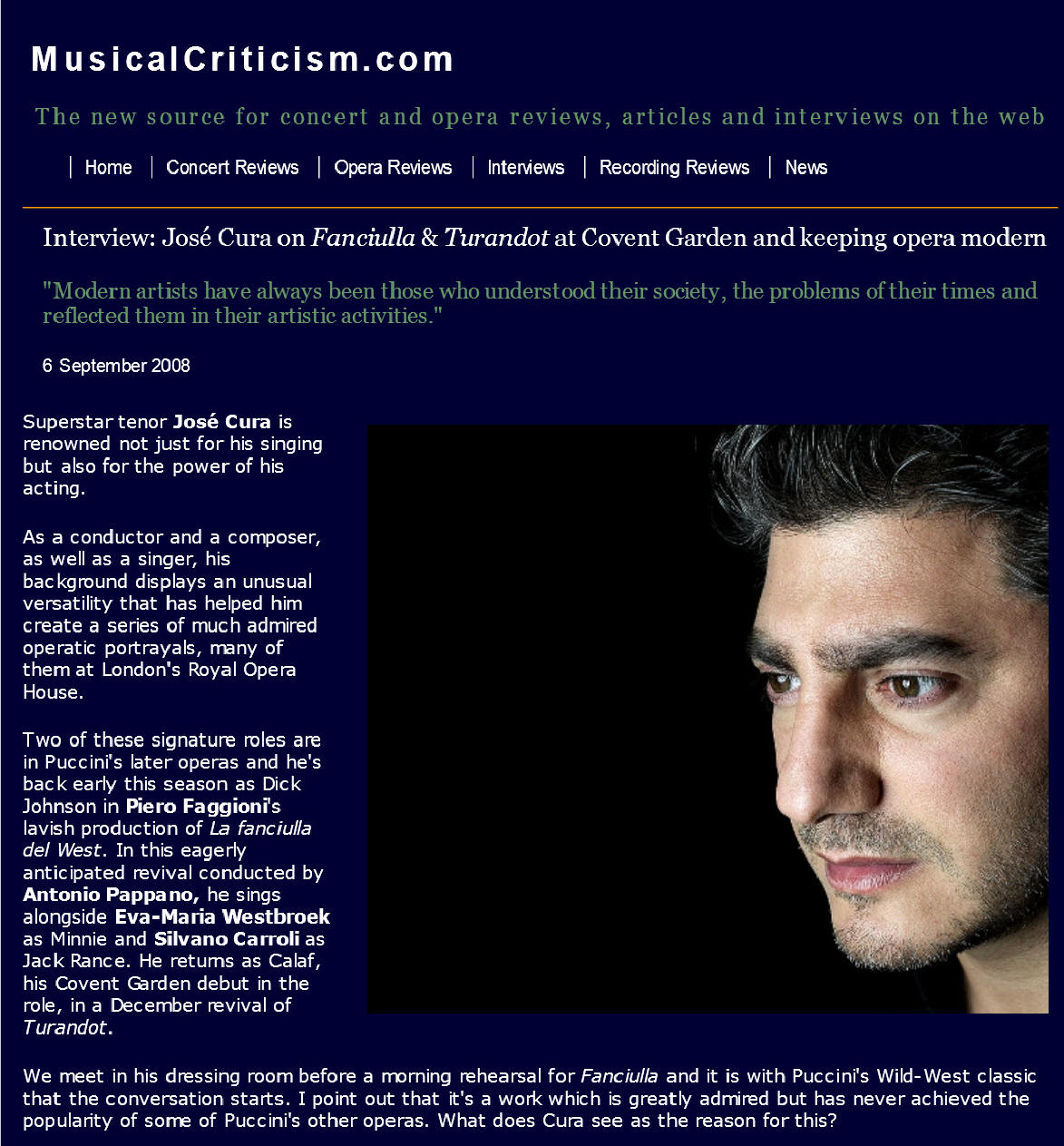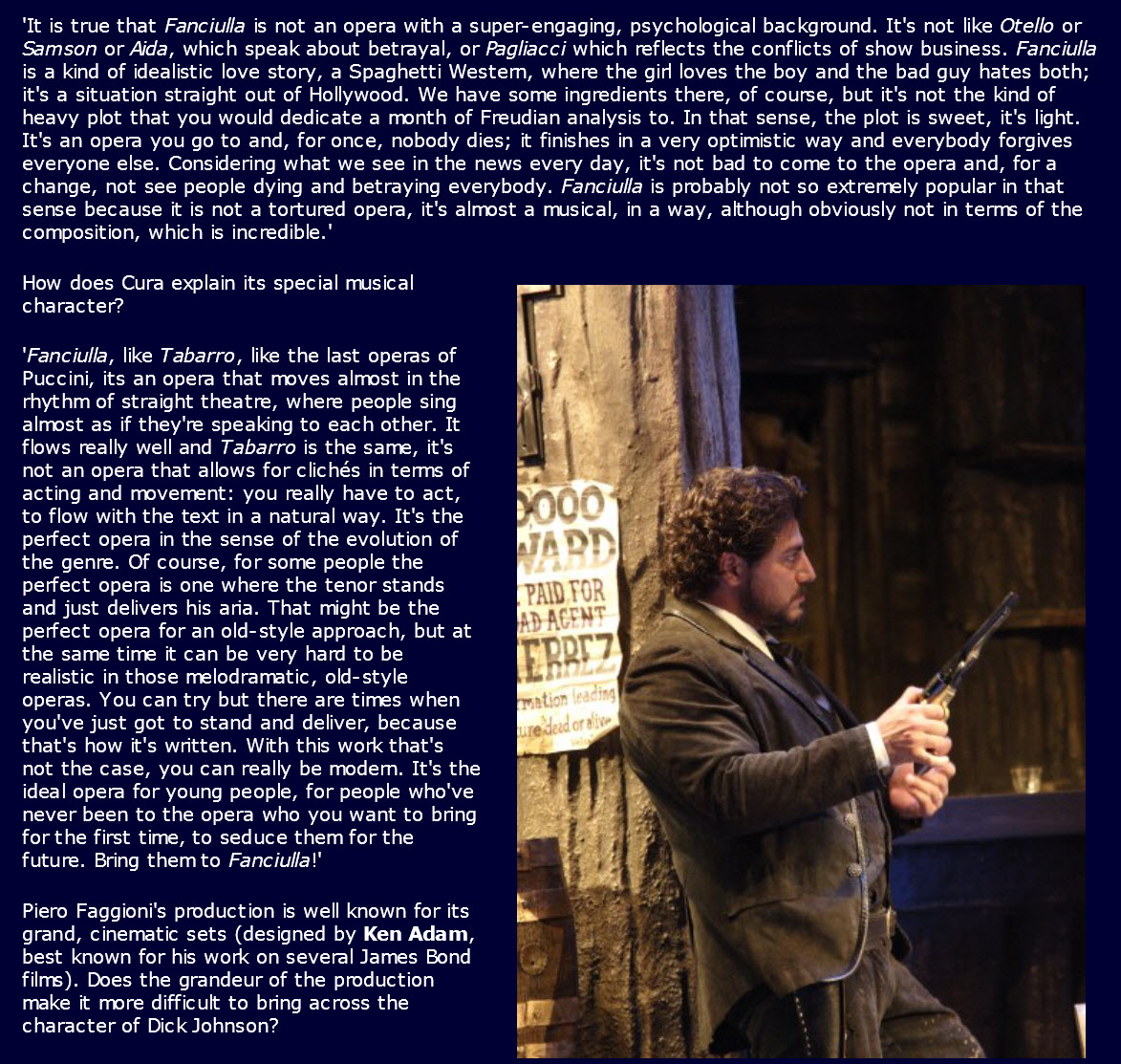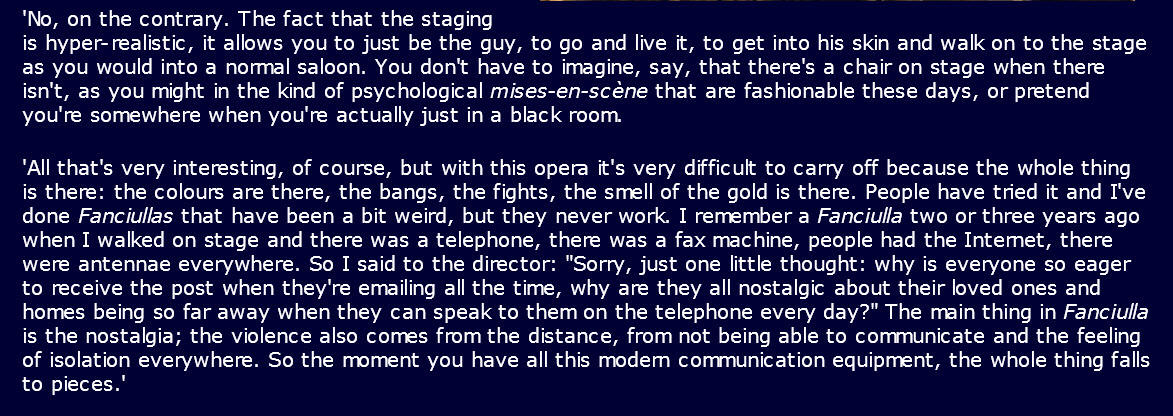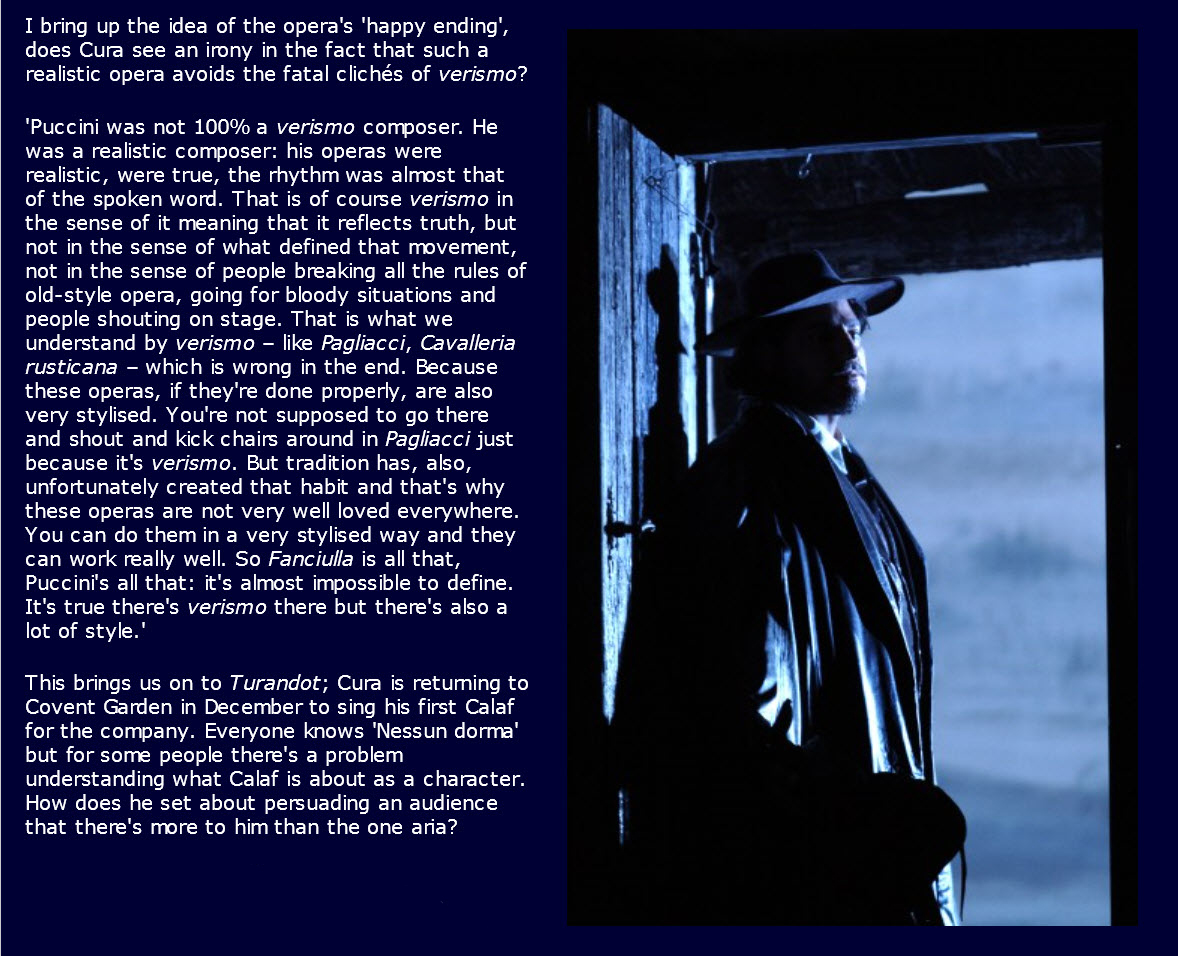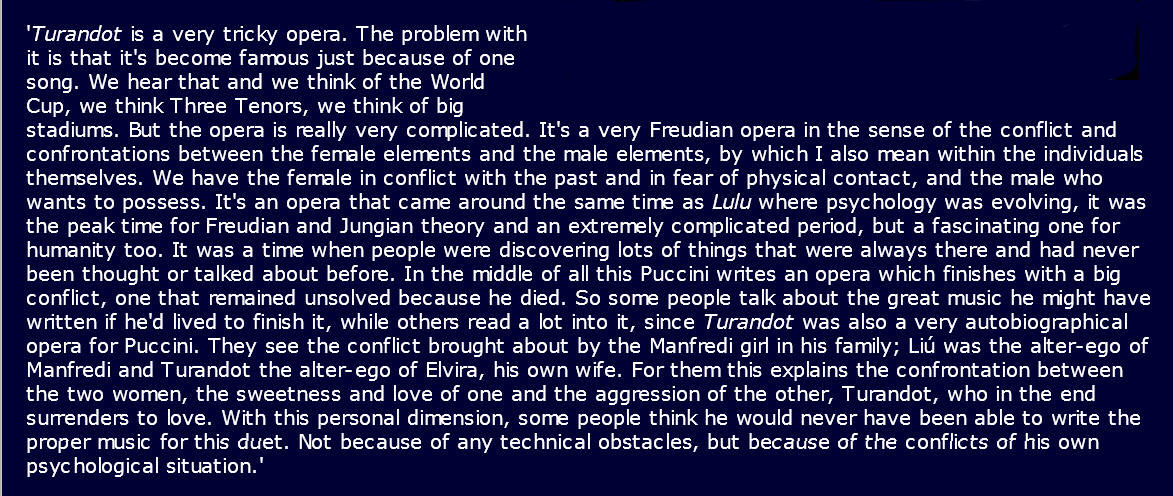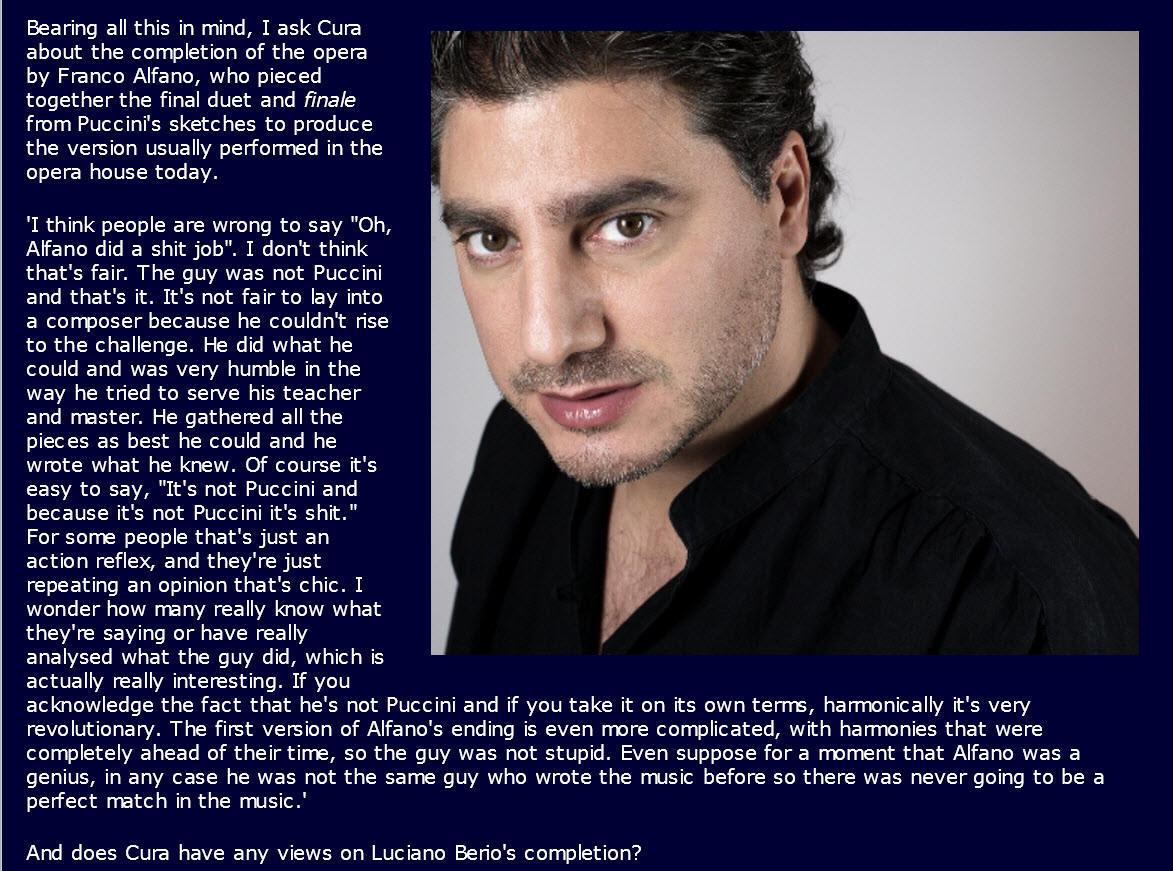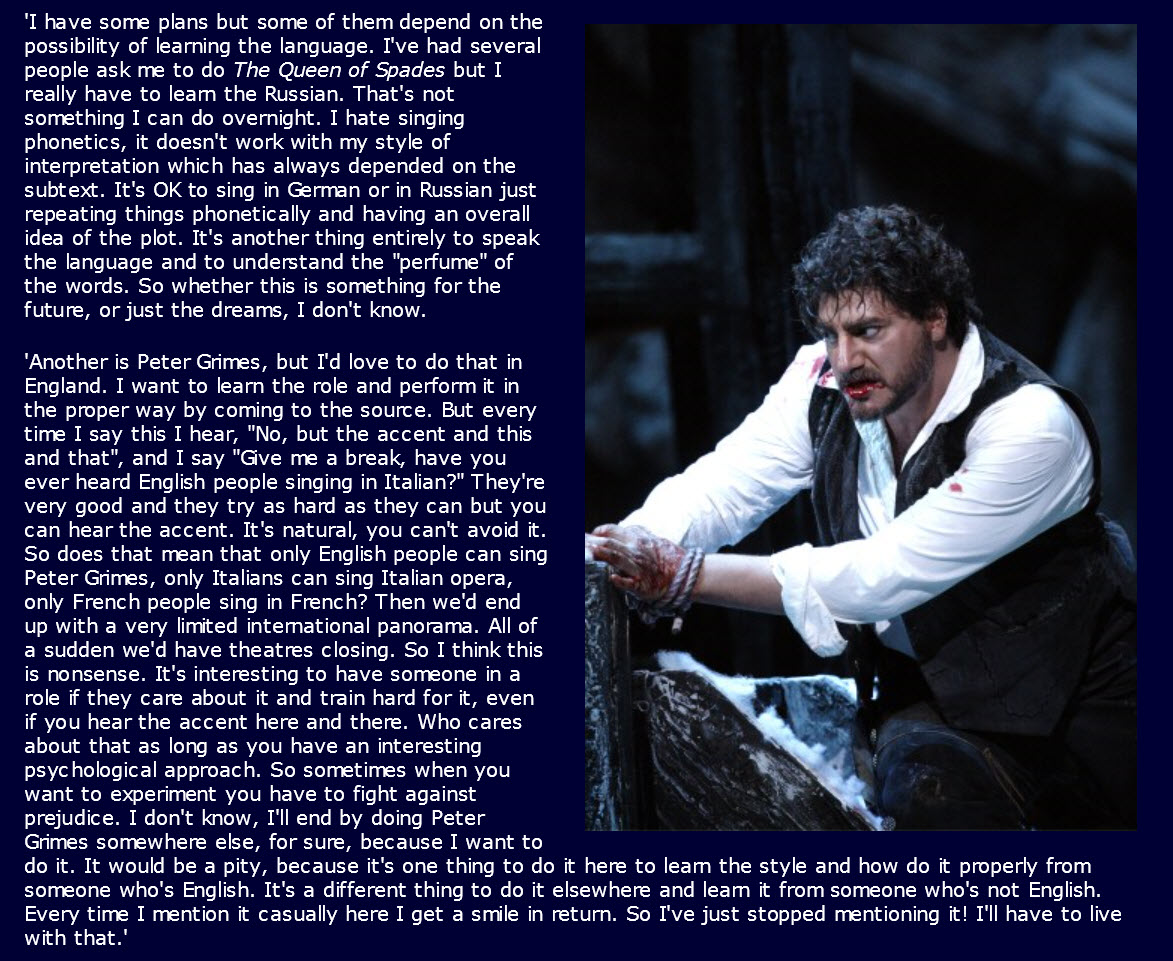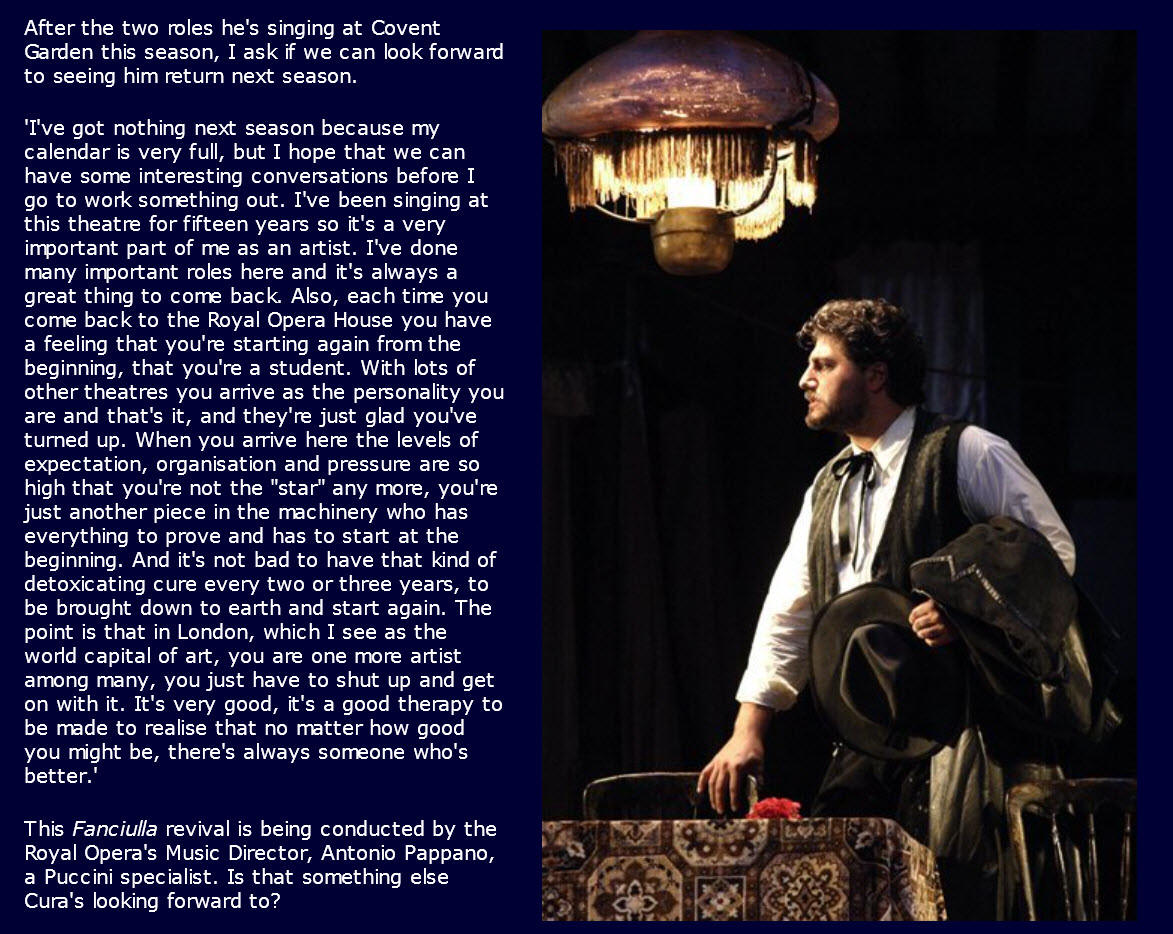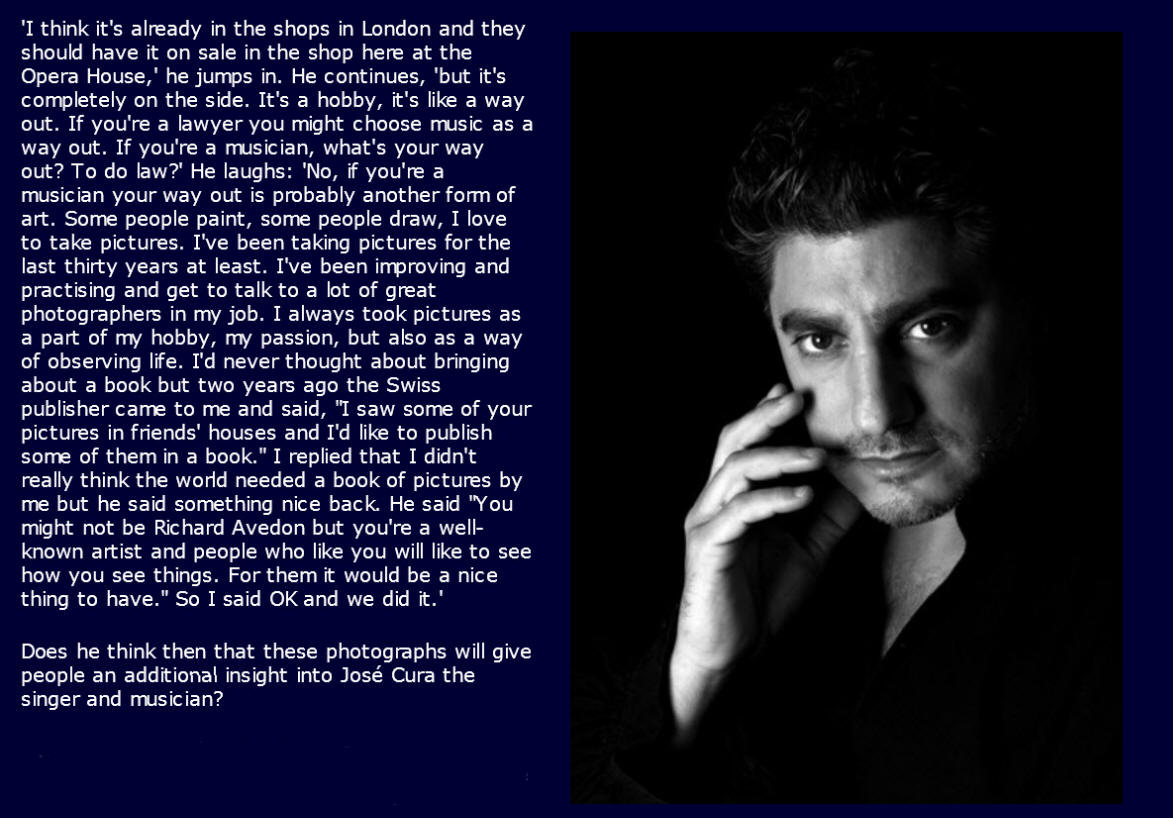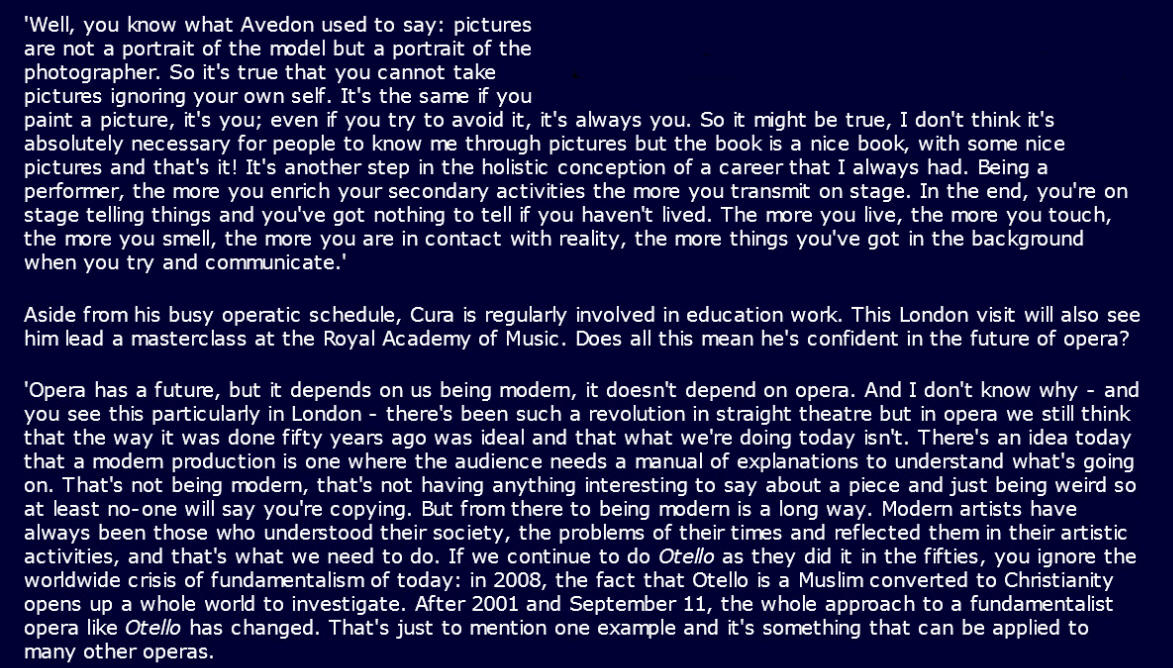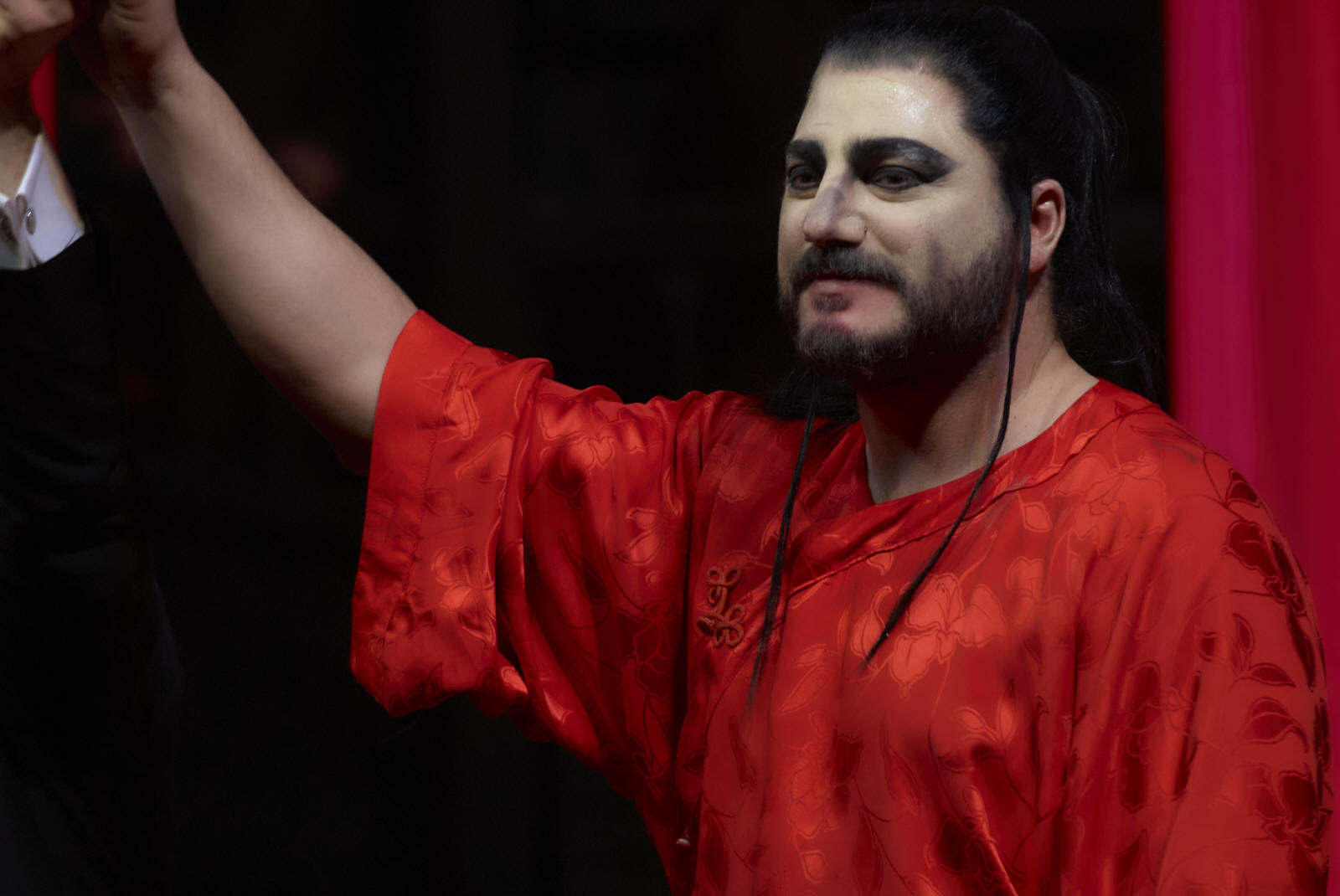Turandot 2008 - 2015
Hannover Gala - December 2008
| Turandot, Hannover, December 2008: “This production is just annoying, with no concept, with costumes somewhere between a Chinese restaurant and a pajama party, made bearable only with the excellent musical performances. And those there were on this particular evening. Star tenor José Cura is like the Lance Armstrong of the international opera world, always on the go and powerful when he arrives. [Unfortunate, then, in] Nessun dorma, that aria of arias for tenors, he was a little shaky at the start, then steadied but without the necessary final power. The applause that usually comes here was missing. But the evening was worth every penny! The concept of an opera festival evening with special guest seemed to work, the opera was sold out, and the applause was of Vienna’s level.” Neue Presse, December 2008 |

|
|
|
London ROH
December 2008 - January 2009
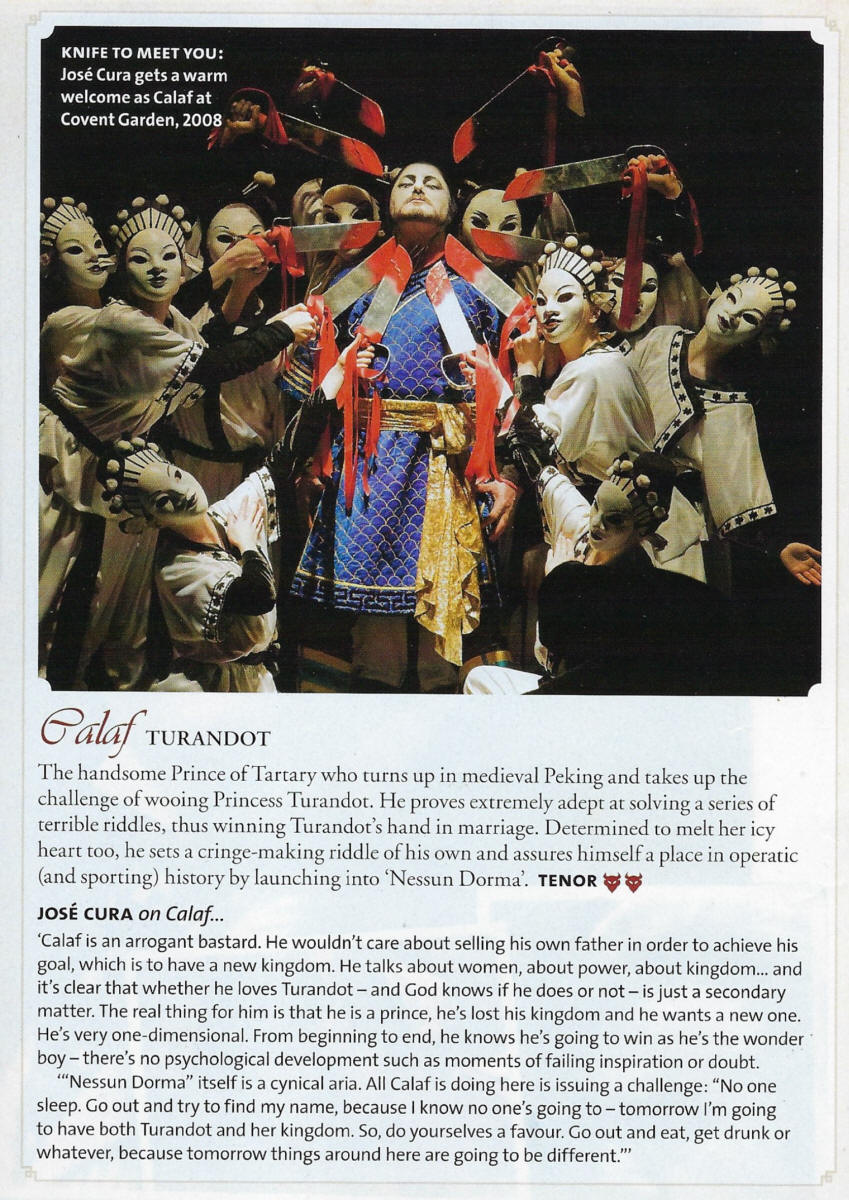
|
Turandot, London, December 2008: “Iréne Theorin sang Turandot without obvious strain, though positioning herself strategically at the front of the stage. She does not have a man-eater of a voice but the top notes arrive with a laser-like brightness. It was José Cura's Calaf who was more inclined to sound under the weather, husbanding his resources through the first half and only trusting his dark Latin tenor to ring out in time for ‘Nessun dorma’.” Financial Times, 3 January 2009 Turandot, London, December 2008: “If the tenor in Turandot is to be judged by ‘Nessun dorma,” then José Cura has truly passed the exam with the note in Covent Garden. Hot, exciting, and restrained, the Argentine shone in the aria that made Pavarotti famous and molded it to suit his voice, adding the cherry to the top of the huge spectacle. A triumph.” El Mundo, 06 January 2009 Turandot, London, December 2008: “I can’t remember the last time such a wonderfully musical Turandot graced the Covent Garden stage. José Cura as Calaf was on top form, producing some spine-tingling sounds and it was a pleasure that he actually sang 'Nessun Dorma' as if it meant something; his sensitive use of vibrato and understanding of the text puts many other tenors to shame and whether displaying his husky baritonal-tenor voice at mezza voce or full throttle, the results were thrilling.” Music OMH, December 2008 Turandot, London, December 2008: “That’s probably about as far as subtleties go in this show, but who can argue with a production as gloriously on-message as Andrei Serban’s classic staging? Here are outsized severed heads spilling silken blood from their mouths, masked grotesques wielding torture implements and a faceless, brown-smocked chorus whose calls for the executioner are much more convincing than their pleas for clemency. Stylized the violence may be, but this is a theatre of cruelty in which only an action man such as José Cura’s Calaf can possibly prosper. Rather than some milksop princeling, Cura plays the part very much as if Andy McNab had stumbled into imperial Peking: that he’s the reason no one’s getting any sleep (‘Nessun dorma’) is clearly a source of macho pride rather than a cue for a moonlit serenade. Pair his lusty but still nuanced tenor with Connell’s Turandot and the result is a visceral battle of wills.” The Times, 27 December 2008 Turandot, London, December 2008: “Any tenor tackling ‘Nessun dorma’ has the colossal shadow of Pavarotti bearing down on him. José Cura need not fear the comparison. He was once touted as the Fourth Tenor and he certainly has the heft and supreme confidence a successful Calaf needs. As he scaled the heights of ‘Nessun dorma,’ his voice, enriched by an impeccably controlled vibrato, was, like the stars of the text, “trembling with love and hope.” Yet it was also rock-solid, more so than the flimsy oriental structure whose pillars he was clutching. Andrei Serban’s 24-year-old production, revived by Jeremy Sutcliffe, is as spectacular as ever and a serviceable vehicle for singing of this quality.” Evening Standard, 23 December 2008 Turandot, London, December 2008: “Partnering Connell as Turandot's final, successful suitor is José Cura's Calaf. There's the odd moment when his interpretative freedom slides into idiosyncrasy, but elsewhere his upfront physicality and bracing tone allow him to hold his own in his vocal wrestling match with Connell.” The Guardian, 5 January 2009 Turandot, London, December 2008: “Argentinian tenor José Cura gradually rises to the occasion as Prince Calaf, underpowered to begin with and gaining confidence in much the same way as he did in La Fanciulla Del West. By the time he approaches ‘Nessun dorma,’ he is at full stretch.” Daily Express, December 2008 Turandot, London, December 2008: “Cura’s was a subdued unshowy performance befitting with his perception of Calaf as something of an emotionless ‘bastard’ willing to let Liù die so that he can continue to climb the social ladder. His voice is not lyrical but has a burnished baritonal middle and solid top and the culmination of his performance was an assuredly ardent, if somewhat strangely reflective, ‘Nessun dorma’.” Seen and Heard, December 2008 Turandot, London, December 2008: “José Cura’s Calaf was clearly inspired…his dark tenor may sound throaty and forced these days, but vocally and dramatically he seemed more engaged than on opening night…” Opera, January 2009, Hugh Canning Turandot, London, December 2008: “How ironic that the one Puccini opera left unfinished at his death should end (or so it was deemed by those responsible for the finishing touches) with what has become the greatest of his hits – ‘Nessun dorma’. It was a good night, too, for José Cura, well suited to the craggy heroics of Calaf, dark and strong in the middle voice and wholehearted in that aria.” The Independent, 23 December 2008 Turandot, London, December 2008: “José Cura is certainly not immune to the temptation of milking this moment, unleashing his longest long note at the ending. Calaf is not the most engaging of heroes; indeed his single-minded pursuit of Turandot at the expense of the more sympathetic Liù makes him decidedly unappealing. Cura’s voice is not perfectly schooled but it has an appealing baritonal timbre and even if he’s occasionally cavalier with note values he does know how to hold a stage.” Musical Source, 23 December 2008 Turandot, London, December 2008: “At the Royal Opera House, Nicola Luisotti stamps his fiery theatrical personality on an otherwise routine account of Turandot, decently but unmemorably sung by a polyglot cast. Illness had struck down Iréne Theorin. Her place as the principessa was taken by Elizabeth Connell, now 62. Unsurprisingly for a singer at this stage of her career, her tone production is variable, coarse and rasping as well as gleaming, but not much more so than that of the considerably younger Cura. He remains a maddeningly uneven artist - casual and uninvolved one moment, on fire the next. He hit his best form for ‘Nessun dorma,’ but a triumphal top C didn’t ignite the audience. If Cura goes beyond clocking in it could prove something special.” The Times, 4 January 2009 Turandot, London, December 2008: “José Cura is an ideal bit of casting as Calaf, the handsome, young "Unknown Prince". A rich sounding tenor with the range to pull off "Nessun Dorma" but the good sense to try and inject drama into everything. It might be an aria that is commonly sung like a battle victory celebration but the words suggest anything but and Cura was more than good enough to make it bitter sweet….A great night out.” The Teenage Theater Critic, 24 December 2008 Turandot, London, December 2008: “José Cura is certainly not immune to the temptation of milking this moment [i.e., Nessun dorma], unleashing his longest long note at the ending. Calaf is not the most engaging of heroes; indeed his single-minded pursuit of Turandot at the expense of the more sympathetic Liù makes him decidedly unappealing. Cura’s voice is not perfectly schooled but it has an appealing baritonal timbre and even if he’s occasionally cavalier with note values he does know how to hold a stage…. This revival is strong and will be enjoyed by any newcomer to the work. Die-hards too will find much to enjoy.” ClassicalSource, December 2008 Turandot, London, December 2008: “The Italian conductor is clearly not one to wallow in the luxurious colors of Puccini's japonaiserie; from his stern, tense account of the opening he kept the music flowing, pushing each act towards an inevitable conclusion. ‘Nessun dorma’ itself, powerfully sung by José Cura, was shorn of superfluous sentimentality and Luisotti pushed through without affording the audience a chance to break the momentum with their applause. As Calaf, Cura was in fine fettle yet seemed in the first act to struggle to find the most powerful place for his voice to sit. The dark, baritone timbre at times weighed him down, affecting his intonation. He warmed up throughout the evening, though, and was outstanding in a heartfelt but never indulgent account of his big aria. He still has a tendency towards an almost casual manner of delivery that can result in a petulance to his characterization, yet he remains one of only a handful of tenors with a voice that can deliver visceral thrills.” Musical Criticism, December 2008 |
|
|



|
|
Berlin
May 2010
|
Turandot as a Song Festival Der Neue Merker Ursula Wiegand 23 May 2010
[Computer-assisted Translation // Excerpt] Many are already waiting eagerly for the Otello premiere on May 30th, but José Cura, the hero of the piece, is already on site and singing this evening, not Verdi but Calaf in Puccini's last opera Turandot. The role suits his voice and his athletic stature perfectly. His partner as the Chinese Princess Turandot is the British Catherine Foster, who has been working as a young dramatic soprano at the German National Theater Weimar since 2001 and has recently enjoyed success beyond Weimar as Brünhilde. She stepped in and had to fit into Laurent Campellone's (controversial) production in a very short space of time. It was a feat of courage that turns into a brilliant achievement. The very first confrontation between the two in Act 2, when Turandot explains her obsession with chastity and corresponding hatred of men to the stranger by referring to her ancestor Lu-u Ling, became the highlight. Two peple of steel with equally steely, but never painfully harsh, voices confront each others as equals. It was magnificent singing that mad the hairs on the back of your neck stand on end and was rewarded with raaptuous applause. Turandot's reference to an event that took place two thousand years ago seems far-fetched, however. Perhaps it is precisely when the bloody heads of all the suitors who were unable to solve her dark riddles roll that she feels the greatest sexual arousal. This, at least, is the opinion of Lorenzo Fioroni, who conducted the premiere on September 13, 2008. It is obvious that Princess Turandot is a damaged woman, incapable of love, who corrupts the entire state with her bloodlust. This is exactly how Cartherine Foster presented her. [...] And Calaf? He fits into this brutal environment. He falls for Turandot immediately and without restraints, singing (in Italian): "And even if the whole world caves in--I want Turandot." He, who has experienced violence himself due to being exiled, seems to be attracted more by Turandot’ s delight in the senseless exercise of violence than by her much vaunted beauty. He comes as conqueror who wants to break her resistance. This does not look like love. He even risks his own life for this triumph of manhood by giving Turandot the riddle of finding out his name. In doing so, he accepts that the cruel woman will kill her subjects in droves if they don’t find out his name within a few hours. Puccini subtitled this unfinished opera, which was later completed according to his notes, as a "dramma lirico." But only one of the characters is lyrical: the delicate Manuela Uhl in the role of the slave Liù. She is the only one who can really loves, so much so that she sacrifices herself to save Calaf. The performance earned intense applause. […] In the third act, the performers repeatedly have to climb across a grid on the floor, something that seems rather a nuisance. This is perhaps meant to overcome old prejudices and practices. Despite this obstacle, we once again experienced the art of singing at its finest. Here Catherine Foster proved that her big voice is also capable of delicate nuances. Cura on the other hand showed himself intensely passionate. While the dead Liu still dangled grotesquely from the gallows, the two confessed their love to each other, a love born of violence. The old king, relieved, places his crown on Calaf's head. Conductor Laurent Campellone and the orchestra of the Deutsche Oper Berlin brought energy to the score, Puccini's most modern but earned a few boos at the end. Catherine Foster, José Cura and Manuel Uhl were celebrated abundantly with bravos and standing ovations. Rightly so; after all, they presented us with a veritable Songfest at Pentecost.
|
|
|
Bonn Gala
May 201
5|
|
Mannheim
November 2015
|
Turandot, Mannheim, November 2015: “José Cura is still attractive as Calaf ….Cura, whom was last encountered in Mannheim in an excellent Otello, has the vigor, the brilliance and the power and the glory for that summit operatic hit Nessun dorma….Ten minutes of applause at the end, sometimes even stormy….” Mannheimer Morgenpost, 29 November 2015 |
|
|


